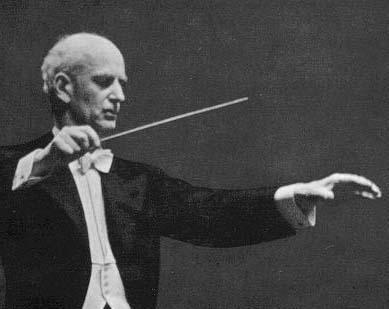Aura is a popular term in recent years. The fifth edition of the Modern Chinese Dictionary I have in hand has no interpretation of this. The explanation on the Internet is that the aura refers to the influence of a person's temperament on the people around him, and it is a description of the invisible energy emitted by people, which reflects how much natural laws people can grasp. This explanation is a bit esoteric, but it seems to say something. As I understand it, aura refers to the infection or influence of a person's unique temperament or charm on the people around them. This is relatively common among scientists, scholars, and artists with profound scientific, humanistic and artistic accomplishments.

Furtwängler
There are auras among musicians, and there is no shortage of interesting records in historical records. For example, the great French composer Berlioz is also a first-class conductor. On one occasion, without rehearsal, he directed his masterpiece, the symphonic poem "Carnival of Rome". Before the performance, both the band and the audience sweated at Berlioz's unconventional move. But on the day of the show, as soon as Berlioz appeared on the scene, people found such worries to be superfluous. I saw him standing still on the podium, his eyes like a torch, glancing at every player in the band, as if to say: Don't worry, I am here, everything is under control. The beats he hit were accurate and powerful, and the cues were in place and impeccable. The unskilled band seems to have been magically performed to play "Roman Carnival" with ups and downs, contrasts and climaxes. The performance was a complete success.
Berlioz's aura speaks for itself. The reason for this is that he has the dual talent and talent of composer and conductor. To use the Chinese saying: no diamonds, no porcelain work. But what exactly is a diamond diamond? Sometimes it's really hard to say. The German conductor Furtwängler is an example. Furtwängler is known for his romantic style of conducting with eight poles and a wandering heart. Some of the old Philharmonic players who had long worked under him talked privately about the mysterious aura of Furtweengler as soon as he walked from the lounge to the stage before each concert. The famous French conductor Mondu once said one thing: once he conducted the Berliner Philharmoniker to perform Beethoven's "First Symphony", no matter how he beat it, the beginning of the first movement was always uneven, and the result was not good at the concert. Later, Furtwegler led the Berliner Philharmonic to perform in Paris, and there was also "Bei Yi" in the repertoire, so Mondo went to the concert, and he wanted to see how Furtweengler handled this difficulty. Furtwängler's shots were still his signature, hard-to-see shake, but the band's performances were surprisingly neat and full and nimble.
I have had two hands-on experiences of the musician's aura live. The first time was in the early spring of 2003, when the famous Chinese cellist Yo-Yo Ma came to Shanghai to perform, I went to the Grand Theatre to see his rehearsal with the Shanghai Radio Symphony Orchestra before his performance, Dvořák's Cello Concerto in B minor. There weren't many people watching the rehearsal that day, so I sat in the front row and could see the stage clearly. I saw Ma Youyou walking lightly and freely from the backstage to the stage, smiling and greeting the conductor and the chief orchestra, without a little shelf. However, when he sat down and pulled out the first phrase deeply after the orchestra's overture, a warm and charming atmosphere instantly spread throughout the Grand Theatre. As the music unfolded, Yo-Yo Ma's performance was sometimes thrilling and fanatical, sometimes beautiful like a song, but always attracted the orchestra like a magnet to echo him, as if he was not only a soloist, but also a conductor who really controlled the orchestra. I have to marvel: Yo-Yo Ma's aura is really strong, and there is a magical appeal to the band.
Another time was at a music lovers' orientation party a few years ago, when an amateur band was invited to help. To be honest, the level is really not good, it feels like a classic car, driving shakily, and there is a danger of falling apart at any time and anywhere. On that day, the conductor Chen Xieyang also came. At the end of the party, the host warmly invited him to conduct the orchestra to play a song. Amid the warm applause of everyone, Chen Xieyang stepped onto the podium. He confidently waved his stick and slapped it, and the beautiful and euphemistic melody of Liu Tianhua's "Good Night" sounded. It was really God, just now the band was still loose and messy under his unhurried, clear and powerful gestures, the face suddenly changed, the voice became boardy, eye-catching, neat and full. Obviously, Chen Xieyang's aura was passed on to this folk band that had never been touched before, like a stone turning into gold, guiding the smooth progress of the performance until the end, and also making the joyful atmosphere of the whole audience reach a climax. (Liu Wei)